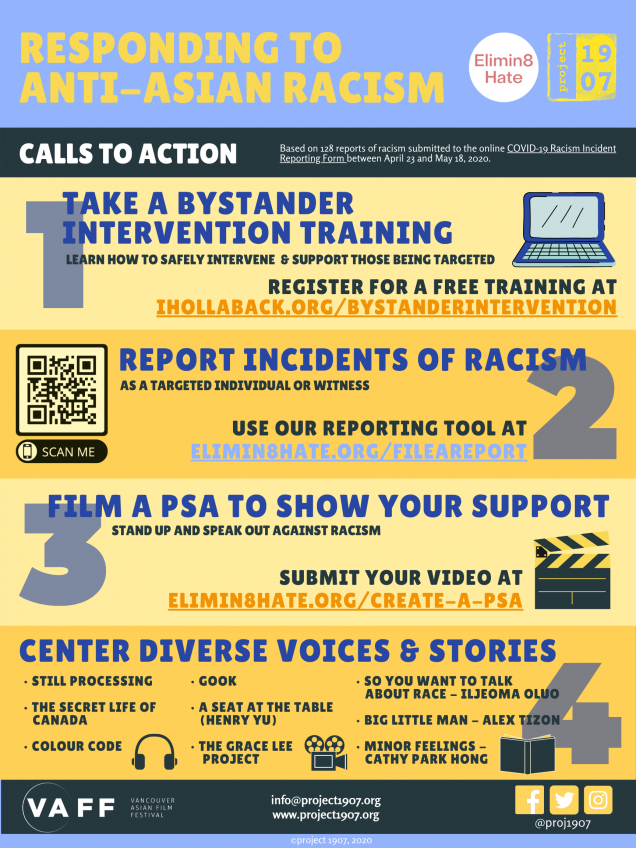Websites allow people to report COVID racist experiences
Websites allow people to report COVID racist experiences
 There are now websites that track racist incidents across Canada
There are now websites that track racist incidents across Canada
By Irish Mae Silvestre
The Philippine Reporter
Long before COVID-19 became a pandemic, stirrings of anti-Asian sentiments were already being felt by the community across the globe. Now, two Canadian websites are giving people the space to share their experiences.
Toronto-based website Fight COVID Racism and the Vancouver-based project 1907 are compiling stories from people across Canada who have experienced COVID-19-related racism. Through online forms and tools, people can report their experiences, allowing organizers to track details like geographical locations, as well as the type of incidents. People can also report incidents they’ve witnessed.
 “This is an ongoing conversation as we know COVID continues to evolve,” says Kennes Lin, co-chair of the Chinese Canadian National Toronto Chapter (CCNCTO), the organization that manages Fight COVID Racism. “We hope that by collecting data across the nation that we now have clear percentages and clear numbers so we can speak to this through all levels of government, as well as using different means of advocacy.”
“This is an ongoing conversation as we know COVID continues to evolve,” says Kennes Lin, co-chair of the Chinese Canadian National Toronto Chapter (CCNCTO), the organization that manages Fight COVID Racism. “We hope that by collecting data across the nation that we now have clear percentages and clear numbers so we can speak to this through all levels of government, as well as using different means of advocacy.”
The website is funded by the Canadian Heritage and the CCNCTO and is being promoted in school boards and among frontline workers. So far, the site has received 300 incident reports.
They’ve also been collaborating with project 1907, a group that gets its name from the year that anti-Asian race riots took place in Vancouver. It’s the brainchild of community organizers Ellen and Doris, who have asked to have their last names withheld after being targets of racist attacks themselves.
“We had actually called the police after one of the incidents and we found out very quickly that the police don’t necessarily track this kind of data,” explained Doris. “There’s a real gap in terms of how these incidents are recorded.”

Kennes Lin
A Culture of Silence
One of the challenges of encouraging people to share their stories is the community’s unwillingness to speak up. However, the rising number of incidents is forcing more Asian Canadians to share their experiences.
“Often when we experience racism, we’re told not to talk about it or we’re told to go to the police but it’s not always an option for a lot of people for a variety of different reasons,” said Ellen.
“This is a space for the Asian community to feel confident in speaking about their experience of racism to shed light on other dynamics that are going on,” said Doris. “I think that’s really powerful for the community.”
Lin stated that the Asian culture that emphasizes modesty and humility discourages people from reporting these incidents.
“The presence of an online tool validates people’s experiences,” she said. “No matter how small or large, aggressive or violent, it needs to be validated so we can confront these issues together.”
While project 1907 contacts people to offer support, they’ve found that, more often than not, people simply want to be heard.
“They find it cathartic to document their experience, to know that it’s going somewhere, and that somebody is listening and recognizing it,” said Doris.

Atty. Avvy Go
Dealing with Racism
During the launch of Fight COVID Racism, Lin said that an Asian healthcare worker in Toronto shared her story about wearing a mask in public and being approached by an individual who spat in her eye. Lin said that when experiencing racism, people are often shocked and confused.
“East Asian communities are quite used to the institutional racism, microaggressions and systemic racism,” she said. “But when it comes to interpersonal violence for the past 20 years, it hasn’t occurred this way.”
Ellen said she feels the daily anxiety of not knowing what can happen.
“When I’m going out, I anticipate that something’s going to happen and I wonder how I’m going to respond,” she said. “That anticipation is stressful.”
And when experiencing racism, Lin advises focusing on the individual’s safety first.
“Yes, the tool is present but report it on your own time when you feel like you have processed it and feel comfortable,” she said.
“People need to be emotionally ready when they’re reporting their experience.”
For more information, visit project1907.org and covidracism.ca.
————————————-
A Foundation for Change
In an effort to tackle systemic racism and discrimination, the Building a Foundation for Change: Canada’s Anti-Racism Strategy 2019-2022 will invest $4.6 million to establish a new Anti-Racism Secretariat within the Department of Canadian Heritage. Federal institutions will identify and respond to issues affecting minority communities, as well as the impact of new or existing policies.
Comments (0)